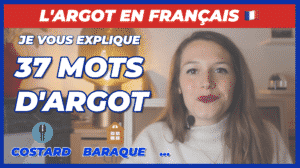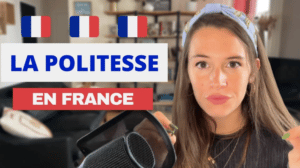In addition to this video, check out this article on the use of the expression of nothing in French.
Transcript
Thank you. It's really important to say thank you, to thank someone who has done you a favor, done something for you or said something nice to you.
But when someone says thank you or thank you very much to you, what can you say? How can you respond politely to a thank you?
What are the equivalent expressions in French to "you're welcome" in English?
When you do someone a favor, say something nice to them, help them out, they say thank you.
Perhaps you've been taught to answer him with "you're welcome". Merci - de rien. "De rien" is the most basic, classic polite response you'll ever hear in French.
You're welcome, it really means that what you did wasn't much. But there are other expressions you can use. Some are more polite, some more colloquial, some just formal.
We're going to look at six of them together today.
Before I start, I'd like to tell you about a platform that can help you progress in French in a fun way, especially if you like films and TV series.
The platform is called Lingopie, and I'd like to thank them for sponsoring today's video.
As I've already told you, I get a lot of requests for partnerships, but I really only choose brands or tools that I think are really great and above all super useful for you.
Lingopie is a streaming video-on-demand platform, a bit like Netflix, but for people who want to improve their foreign language skills.
On this platform, you will be able to find movies, TV series, documentaries or TV shows.
Once you've chosen a video you like, you can launch it and get interactive subtitles. In other words, when you move your mouse over a word you don't understand, you'll get an English translation.
The words you click on will automatically be added to flashcards - vocabulary cards. You can review the new words you've learned, the new words you've heard.
And each time you can re-watch the clip in which you saw it, it gives you a context and is very good for you, for memorizing these new words.
New movies and shows are added to the platform every week. Lingopie offers a seven-day free trial. This allows you to test and see if this mode of learning suits you.
Lingopie is offering a very generous promotion of 65 % on the annual subscription if you follow the link in my description. Thank you very much Lingopie.
Now back to the subject of the video and the alternatives to the expression of nothing. The first one we're going to look at is "please".
You're welcome. You're welcome. This is one of the most classic, formal and polite alternatives to you're welcome. You'll use this expression if you see the person you're addressing, if you say you and not you.
In general, we use the formal form of address, either because we don't know the person, or out of respect.
Please, you can use it at work, in stores, with strangers. It's really quite classic. I'll give you a context. For example, if you're on vacation in Paris and you go to your hotel reception to ask for information about the restaurants around the hotel, you're going to ask the receptionist if he knows any good restaurants.
For example, he will answer: of course, I can recommend Le Bistrot des Plantes or Le Verre Siffleur, they are very good restaurants.
You will say thank you to him and he will certainly answer you please.
You're welcome. Je t'en prie, you see, sounds a lot like je vous en prie. It's the same formula, but in a tutelary version. When you know the person well or are on first-name terms, je vous en prie becomes je t'en prie.
It's still a very polite formulation, but quite formal all the same. Of course, you can use it with family, friends or colleagues.
Here's an example if you're at the table with friends or family and you ask can you please pass the salt? Thank you very much.
With pleasure. Avec plaisir, I think, is the alternative to "you're welcome" that I use the most. I really like this formulation. Generally speaking, I also use "je vous en prie" and "je t'en prie" a lot. But it's true that I also like to use it a lot in emails, for example.
It means nothing, but there's an extra dimension. You want to express that you really enjoyed helping someone or doing something for that person.
You were happy to do it. It adds a little friendliness to the formula. Like je vous en prie or je t'en prie, it's still formal, so you can use it with anyone.
Both with strangers and with people you know. Here's some context. If someone says to you, "Could you help me revise for my French exam this afternoon? I really need help.
Of course, I'll help you revise. Thank you so much. My pleasure.
Let's move on to the fourth expression.
My pleasure. So you see, it looks like the one we've just seen "with pleasure" and here, the pleasure is all mine. This formulation is really very, very formal, very polite.
The last time I heard it, I think it was in some fancy restaurant. You really want to emphasize that you really enjoyed it. Of course, you can use it in less formal settings, but you really want to insist.
For example, you could use it in a professional exchange. Here's a context. For example, let's imagine when I finished my studies, I had to hand in a dissertation and I interviewed people to write my thesis.
So I could say to one of these people: thank you for agreeing to meet me. It really helped me a lot with my dissertation. The person might reply, "My pleasure".
You're welcome. This is a more colloquial expression. You're more likely to use it with family, friends or colleagues you're close to, for example. It's more everyday language, less formal.
There's no need, it's really implied there's no need to thank me.
It's not even worth saying thank you. As you know, in French, we love to make contractions of words. So, very often, instead of il n'y a pas de quoi, you'll hear "y a pas de quoi".
I don't know if you remember, but I made a video about fast spoken French. Very often, "il n'y a" doesn't come with "y a".
If you haven't already seen it, I'm going to give you the video just above, so that you can understand this contraction.
Thank you so much for lending me your dress for the evening. Don't mention it. You're very welcome.
And finally, let's end with one last alternative, which is simply "it's me". It may sound a little odd to say "it's me". But what's really implied is that I'm the one who thanks you.
But very often, in France, we just say c'est moi.
This expression is often used when the benefit is mutual. For example, if you buy something in a store, you'll say thank you. The person might say, "It's me," because the benefit is mutual.
It's a bit similar to merci à vous and merci à toi. If I say thank you to someone, they may say no, thank you, or no, thank you.
It's a bit like me. It's a shared pleasure. A little context, for example at the bakery if I say.
Hi, I'd like two croissants and a baguette, please.
The baker will give them to you. You say thank you. And the person can answer: it's me or thank you.
That's it for today. I hope you've enjoyed this video, and that you've been able to expand your French vocabulary with these expressions. Let me know in the comments if you know of any other alternatives to you're welcome, because there are so many more, we couldn't possibly show them all here today.
If you liked this video, please support the channel by putting a j'aime. And if you haven't yet subscribed, don't forget to do so, and above all to activate the bell to receive all my videos.
I'll see you soon.








